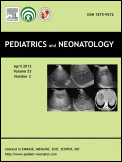
Pediatrics and Neonatology
Scope & Guideline
Advancing child health through open access research.
Introduction
Aims and Scopes
- Neonatal Health and Development:
Research focused on the health outcomes, developmental milestones, and interventions for neonates, particularly those born preterm or with congenital conditions. - Infectious Diseases in Pediatrics:
Studies addressing the epidemiology, diagnosis, treatment, and prevention of infectious diseases affecting children, including emerging pathogens and their implications. - Genetic and Metabolic Disorders:
Exploration of genetic conditions, metabolic disorders, and their management in pediatric populations, including advancements in genetic testing and therapies. - Clinical Interventions and Outcomes:
Evaluation of various clinical interventions, including surgical techniques, pharmacological treatments, and their impacts on patient outcomes in pediatric and neonatal settings. - Public Health and Epidemiology:
Investigations into public health issues, epidemiological trends, and risk factors affecting children's health, including vaccination strategies and health disparities. - Neonatal Intensive Care Practices:
Research on practices within neonatal intensive care units (NICUs), focusing on quality improvement, management protocols, and care strategies for critically ill infants.
Trending and Emerging
- Impact of COVID-19 on Pediatric Populations:
Research exploring the effects of the COVID-19 pandemic on children's health, including mental health outcomes and the management of pediatric diseases during the pandemic. - Neonatal Neurodevelopment and Long-term Outcomes:
An increasing focus on understanding the neurodevelopmental trajectories of neonates, particularly those at risk, and the interventions that can improve long-term outcomes. - Innovative Therapies and Technologies:
Emerging studies on the use of novel therapies, such as gene therapy and advanced pharmacological treatments, aimed at addressing previously difficult-to-treat pediatric conditions. - Environmental Influences on Pediatric Health:
Growing interest in the impact of environmental factors, such as pollutants and maternal health, on the development and health of children. - Telemedicine in Pediatric Care:
The rise of telemedicine as a viable option for pediatric consultations and follow-ups, especially in the context of the COVID-19 pandemic, has emerged as a significant area of research.
Declining or Waning
- Traditional Pediatric Surgery:
Research related to conventional surgical methods in pediatrics has decreased, possibly due to advancements in minimally invasive techniques and increased focus on conservative management. - Vaccine-Preventable Diseases:
Publications specifically focused on diseases that are preventable through vaccination have waned, potentially reflecting increased vaccination rates and reduced incidence of these diseases. - Chronic Pediatric Illness Management:
Research addressing long-term management of chronic illnesses in children, such as asthma and diabetes, appears to be less prevalent, possibly overshadowed by acute care studies. - Non-communicable Diseases in Pediatrics:
Studies on non-communicable diseases, such as obesity and metabolic syndrome, have become less frequent, as the journal may prioritize acute care and infectious disease topics.
Similar Journals
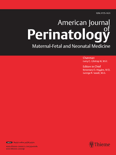
AMERICAN JOURNAL OF PERINATOLOGY
Elevating perinatal care with groundbreaking insights.AMERICAN JOURNAL OF PERINATOLOGY is a premier journal published by THIEME MEDICAL PUBL INC, dedicated to advancing the fields of obstetrics, gynecology, and pediatrics. Since its inception in 1983, this peer-reviewed journal has established itself as a vital resource for researchers, clinicians, and students, showcasing high-quality original research, reviews, and clinical studies that contribute to the understanding of perinatal health. With a notable impact factor and rankings placing it in the second quartile across multiple categories—including Obstetrics and Gynecology, and Pediatrics, Perinatology, and Child Health—the journal is recognized for its rigorous academic standards and significant contribution to improving maternal and neonatal outcomes. Although currently not an open access publication, the journal offers premium access options, ensuring that subscribers and institutions can stay informed about the latest developments in the field. With an aim to bridge research and clinical practice, AMERICAN JOURNAL OF PERINATOLOGY is a crucial platform for disseminating knowledge and fostering innovation in the pursuit of better healthcare for mothers and infants.
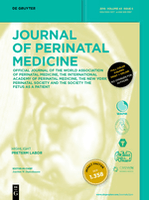
JOURNAL OF PERINATAL MEDICINE
Fostering interdisciplinary collaboration for better outcomes.JOURNAL OF PERINATAL MEDICINE is a reputable peer-reviewed journal published by Walter de Gruyter GmbH since 1973, with a steadfast commitment to advancing research in the fields of Obstetrics, Gynecology, Pediatrics, and Perinatology. With an impressive impact factor reflected by its Q2 quartile rankings in both Obstetrics and Gynecology and Pediatrics, this journal serves as a vital resource for professionals and researchers dedicated to improving maternal and child health outcomes. The journal's robust Scopus rankings, where it stands at 76th out of 330 in Pediatrics and 64th out of 209 in Obstetrics, further underscores its significant contribution to the academic community. Featuring cutting-edge research, clinical studies, and reviews, the JOURNAL OF PERINATAL MEDICINE strives to foster a deeper understanding of the complexities surrounding perinatal health while promoting interdisciplinary collaboration. Published in Germany, the journal remains accessible to a global audience, ensuring that essential findings are disseminated to drive innovation and best practices in the field.

Journal of Clinical Neonatology
Empowering practitioners with evidence-based advancements.The Journal of Clinical Neonatology, published by Wolters Kluwer Medknow Publications, is a premier multidisciplinary journal dedicated to advancing the field of neonatology through high-quality research and clinical insights. With a robust ISSN of 2249-4847 and E-ISSN 1658-6093, this journal aims to foster the exchange of knowledge among neonatologists, pediatricians, and researchers, providing a vital platform for disseminating original investigations, reviews, and case reports that address the complexities of neonatal care. Although it does not currently operate under an open access model, the journal ensures accessibility through various institutional subscriptions. Its commitment to enhancing clinical outcomes in neonates underscores the importance of sharing evidence-based practices and innovations in the field. By maintaining a rigorous peer-review process, the Journal of Clinical Neonatology is well-positioned to serve as a critical resource for professionals and students alike, contributing to the holistic development of neonatal medicine in a rapidly evolving healthcare landscape.
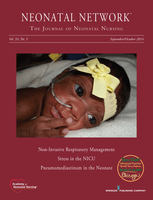
Neonatal Network
Enhancing understanding in critical neonatal development.Neonatal Network, published by Springer Publishing Co, is a respected journal in the field of Critical Care and Intensive Care Medicine, focusing on the complexities of neonatal health and development. With an ISSN of 0730-0832 and an E-ISSN of 1539-2880, this journal has been a vital resource for practitioners, researchers, and students since its inception in 1985. Covering a pivotal scope that encompasses Critical Care Nursing, Pediatrics, and Perinatology, it aims to enhance the understanding and treatment of newborns in critical conditions. Although categorized in the Q3 and Q4 quartiles by Scopus for 2023, its contributions remain significant, fostering a platform where innovative research and clinical wisdom converge for the benefit of neonatal care. As a non-open access journal, it provides insightful articles that are pivotal for enhancing neonatal practices and outcomes, ensuring its relevance as a distinguished academic outlet through 2024. The journal's rich history and focus on interdisciplinary collaboration make it an essential resource for those committed to advancing neonatal health.

Italian Journal of Pediatrics
Empowering global discourse in child health.The Italian Journal of Pediatrics, an esteemed publication within the field of Pediatrics, has been advancing pediatric research and discourse since its inception in 1992. Published by BMC and operating as an Open Access journal since 2008, it ensures that critical findings are readily available to a global audience to enhance child health outcomes. With an impressive Q1 ranking in the category of Pediatrics, Perinatology and Child Health, it stands among the top journals in its field, boasting a Scopus ranking of #43 out of 330, placing it in the 87th percentile. Researchers, healthcare professionals, and students will find valuable insights and innovative research that target the latest advancements in pediatric medicine, making it an essential resource for those dedicated to improving health for children everywhere. The journal's dedication to excellence is reflected in both its impactful publications and its commitment to fostering collaboration and knowledge exchange among practitioners around the world.
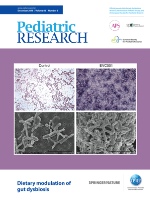
PEDIATRIC RESEARCH
Innovating solutions for child health challenges.Pediatric Research, published by SpringerNature, is a leading journal in the field of pediatrics, perinatology, and child health. With an impressive impact factor reflecting its stature, this journal has been integral in advancing research since its inception in 1967. With a placement in the Q1 category for Pediatrics, Perinatology, and Child Health, and ranking #30 out of 330 in Scopus, Pediatric Research is recognized for its rigorous peer-review process and commitment to disseminating vital findings that impact child health globally. The journal primarily serves as a platform for researchers, healthcare professionals, and students dedicated to exploring innovative solutions to pediatric health challenges. Although not an open-access journal, it provides valuable insights and research that contribute significantly to improving health outcomes for children. Based in the United States, with a global reach, Pediatric Research remains at the forefront of pediatric innovation and scholarship through 2024 and beyond.
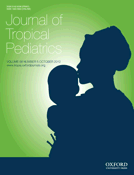
JOURNAL OF TROPICAL PEDIATRICS
Exploring the frontiers of tropical child health.JOURNAL OF TROPICAL PEDIATRICS, published by Oxford University Press, stands as a critical platform for the dissemination of research and clinical advancements in the field of tropical pediatrics. With a rich history dating back to 1955, this journal serves as a significant contributor to our understanding of health issues affecting children in tropical and subtropical regions, focusing on infectious diseases, pediatric care, and child health. It currently holds an impressive Q2 ranking in three categories: Infectious Diseases, Medicine (miscellaneous), and Pediatrics, Perinatology and Child Health, placing it among the top journals in its field. Featuring both formative research and applied studies, the journal aims to address the unique challenges posed by pediatric care in tropical environments. Its inclusion in an esteemed database ensures a broad dissemination of critical knowledge to researchers, healthcare professionals, and students alike, promoting a collaborative approach to improving child health outcomes globally.
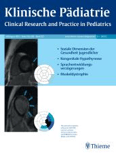
KLINISCHE PADIATRIE
Advancing Pediatric Care Through Innovative ResearchKLINISCHE PADIATRIE is a prominent academic journal published by GEORG THIEME VERLAG KG since its inception in 1972. Based in Germany, this journal serves as a valuable resource for professionals and researchers in the fields of Pediatrics, Perinatology, and Child Health. With an ISSN of 0300-8630 and E-ISSN 1439-3824, it features a rich array of peer-reviewed articles that focus on child health and development, encompassing clinical practices, therapeutic advances, and interdisciplinary approaches to pediatric care. While the journal operates on a subscription basis, its impact within the academic community is evidenced by its ranking of Q3 in Pediatrics, Perinatology, and Child Health as of 2023, and it maintains a solid standing within Q4 in Medicine (miscellaneous). The journal aims to bridge the gap between emerging research and clinical practice, providing a platform for innovative ideas that enhance pediatric care. Researchers, medical professionals, and students alike will find KLINISCHE PADIATRIE an essential addition to their academic repertoire, fostering advancements in pediatric healthcare and enriching knowledge in this vital field.
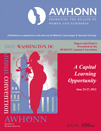
JOGNN-JOURNAL OF OBSTETRIC GYNECOLOGIC AND NEONATAL NURSING
Empowering professionals through evidence-based insights.JOGNN - Journal of Obstetric Gynecologic and Neonatal Nursing, published by Elsevier Science Inc, is a leading peer-reviewed journal dedicated to advancing the field of nursing in obstetrics, gynecology, and neonatal care. With a ISSN of 0884-2175 and an E-ISSN of 1552-6909, the journal has established itself as a pivotal platform since its inception in 1972, showcasing rigorous research and innovative practices that greatly enhance patient care and nursing education. As evidenced by its 2023 impact factor and impressive Scopus rankings—ranking in the top quartile (Q1) in Critical Care Nursing, Maternity and Midwifery, and Pediatrics, and Q2 in Medicine—it provides invaluable insights for healthcare professionals, researchers, and students alike. The journal’s commitment to high-quality, evidence-based articles reflects its critical role in shaping contemporary nursing practices and informing best practices in maternal and neonatal health. While currently not an Open Access journal, the information disseminated through JOGNN remains vital for those striving to inform their practice and improve patient outcomes worldwide.
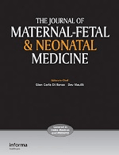
Journal of Maternal-Fetal & Neonatal Medicine
Bridging gaps in obstetrics and pediatrics for a healthier future.The Journal of Maternal-Fetal & Neonatal Medicine, published by Taylor & Francis Ltd, is a leading multidisciplinary journal focused on the critical fields of obstetrics, gynecology, pediatrics, and perinatology. Since its inception, this journal has offered a platform for the dissemination of pioneering research and innovative clinical practices, bridging knowledge gaps and informing the future of maternal and neonatal health. With a commendable 2023 impact factor that places it in the Q2 category of both Obstetrics and Gynecology and Pediatrics, Perinatology and Child Health, it stands at the forefront of scientific discourse, attracting a global readership. The journal aims to provide high-quality articles that contribute significantly to patient care, clinical practices, and policy-making, ensuring relevance and applicability to both researchers and healthcare professionals. With comprehensive access options and an emphasis on the convergence of emerging research trends, the Journal of Maternal-Fetal & Neonatal Medicine remains an invaluable resource for anyone dedicated to advancing the health of mothers and their newborns.